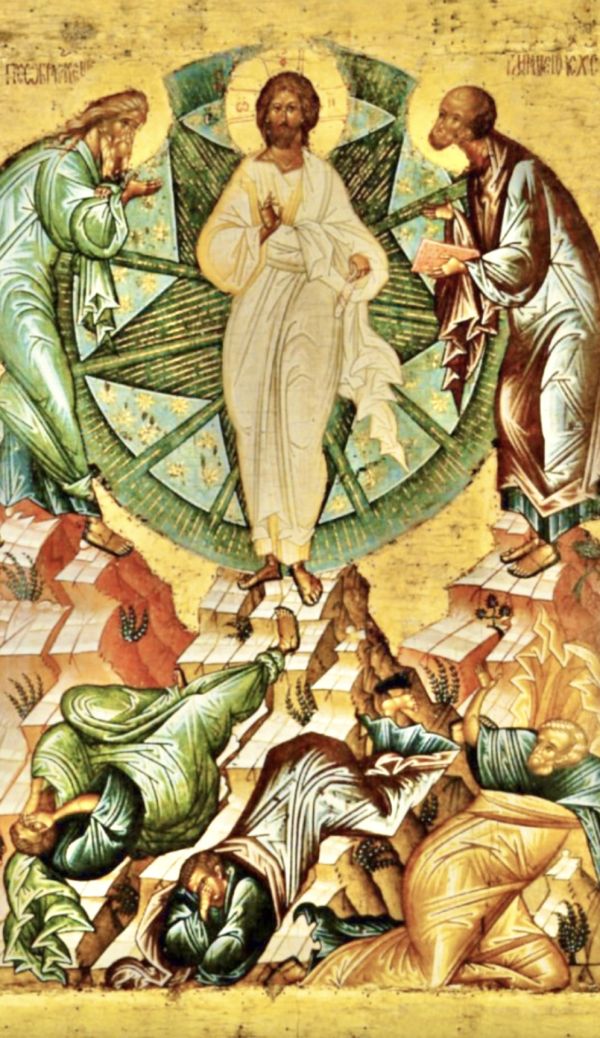(Lk 9:28b-36)
In biblical language, the experience of «the Mount» is an icon of the Encounter between God and man. Yes, for us it’s like “losing our minds”, but in a very practical way - not at all visionary.
The Master imposes it on the three eminent figures of the first communities, not because he considers them the chosen ones, but the exact opposite: he realizes that it’s his captains who need verification.
The synoptic Gospels do not speak of Transfiguration any, but of «Metamorphosis» [Greek text of Mk 9:2 and Mt 17:2]: a passing under a different ‘form’.
In particular, Lk 9:29 emphasizes that «the appearance of his face became ‘other’». Not because of a paroxysmal state.
It sounds crazy, but the hieratic magnificence of the Eternal One is revealed against the tide: in the image of the humble servant.
The experience of divine Glory is unsustainable for the eminent disciples - not in reference to physical flashes of light.
As in Oriental icons, they find themselves face to earth [Mt 17:6 - in ancient Eastern culture it meant precisely: "defeated" in their aspirations] and frightened. Fearful of being they too called to the gift of self (Mk 9:6; Mt 17:6; Lk 9:34-36).
The vertigo of the experience of God was not what they cultivated and wanted.
The dazzling light to which the passage refers (Mk 9:3; Mt 17:2.5; Lk 9:29) is that of a Revelation that opens our eyes to the "impossible" identity of the Son.
He was popularly expected as resembling David, powerful sovereign, able to assure the people a quick and easy well-being.
He’s ‘revealed’ in a reversal: the Glory of God is Communion in simplicity, which qualifies us everyone.
The ‘shape’ of the "boss" is that of the attendant, who has the freedom to step down in altitude to put the least at ease: the humanly defeated one!
Peter elbows more than others to have his say. As usual, he wants to emerge and reiterate ancient ideas, but he reveals himself as the most ridiculous of all (Mk 9:6; Lk 9:33): he’s ranting.
For him [again!] at the centre of the triptych remains Moses (Mk 9:5; Mt 17:4; Lk 9:33).
With the help of prophecies animated by fiery zeal [Elijah], according to Simon, Jesus would be one of the many who makes others practise the legalistic tradition.
At foundatiion remain the Commandments, not the Beatitudes.
The first of the apostles just does not want to understand that the Lord doesn’t impose a Covenant based on obeying, but on Resembling!
Of course, the other "great ones" were also half asleep. Who knows what they were dreaming of... then bewildered, they all look for a Jesus according to Moses and Elijah (Mk 9:8-10; Mt 17:8; Lk 9:36).
In the culture of the time, the new, observant and disruptive Prince was expected during the Feast of Huts.
He would inaugurate the rule of the chosen people over all the nations of the earth (Zk 14:16-19); in practice, the golden age.
In Judaism, the Feast of Booths commemorated the ‘Mirabilia Dei’ of the Exodus [Lk 9:31: here, the new and personalised liberation from the land of slavery] and looked to the future by celebrating the prospects of victory for the protagonist ethnicity.
But the Kingdom of the Lord is not an empire affected by prodigious and immediate verticalism.
To build the Church of God there are no shortcuts, no numb safety points, and there sitting quiet - at a safe distance - by raving about accolades.
[Transfiguration of the Lord, August 6, 2025]












